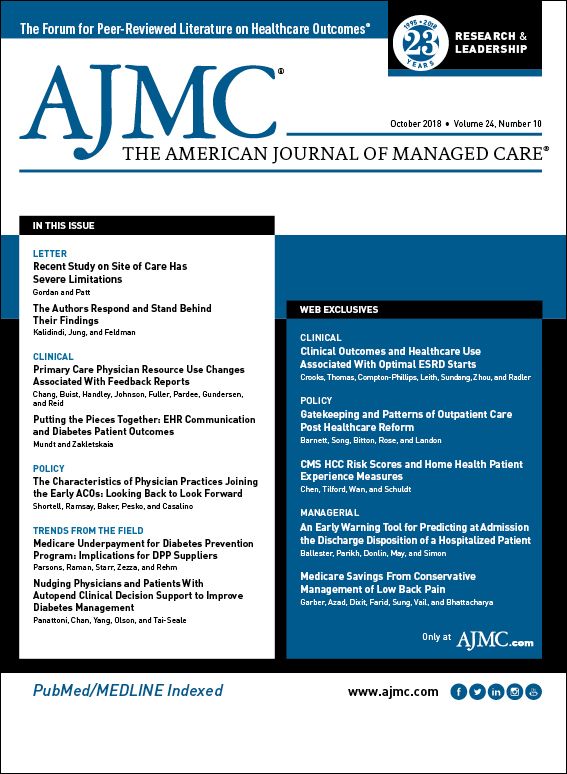- Center on Health Equity & Access
- Clinical
- Health Care Cost
- Health Care Delivery
- Insurance
- Policy
- Technology
- Value-Based Care
From the Editorial Board, October 2018: Bruce W. Sherman, MD
With growing recognition of the prevalence of mental health issues in the US population, now is the time to better understand and meaningfully address the behavioral health needs of lower-income earners. According to the National Institute of Mental Health, low-income individuals are 2 to 5 times more likely to experience a diagnosable mental disorder than individuals in the highest socioeconomic group. Perhaps more concerning is the fact that little is known about how low-wage earners use and adhere to evidence-based behavioral health services.
Complicating the issue is that low-wage earners face an array of barriers to mental health services. The movement of behavioral health clinicians out of health plan networks has reduced in-network provider access. Hourly employees may also have to choose between earning wages or sacrificing pay to seek care during the workday. Growing employer adoption of high-deductible health plans, stifled wage growth, limited in-network access, and increasing deductibles compound healthcare affordability issues and may well contribute to increased stress and exacerbation of pre-existing mental health issues.
Our recent research has characterized high-level health benefits utilization patterns among workers by wage level, but it did not specifically address behavioral health services use. We are unaware of any published analyses assessing behavioral healthcare use among low-income earners. However, on the basis of preliminary data, we hypothesize that low-wage workers are less likely to access ambulatory behavioral health services or be taking psychoactive medications and are more likely to have behavioral health—related emergency department visits and hospitalizations. Those with both behavioral health issues and chronic conditions such as diabetes or heart disease (also more prevalent in lower-income populations) are perhaps at the greatest risk for suboptimal condition management.
Ongoing research will be helpful in assessing new models of behavioral health service delivery and, importantly, the efficacy of integrated primary care and behavioral healthcare, particularly for low-income workers. There is also an urgent need to better understand the potential efficacy and outcomes of less costly behavioral health services for low-income workers, including employee assistance programs and telebehavioral health. To our knowledge, this is yet another area with a limited research base that warrants further exploration. Findings may well yield new insights, prompting changes in benefit design and communications to encourage greater patient awareness, acceptance, and use.
From a broader perspective, social determinants of health (SDoH), including wage, have particular significance for low-income populations; their relation to the prevalence and severity of mental health disorders also merits more in-depth analysis. If strong associations are identified, a case can be made to direct additional resources toward social supports. For employers, and especially those in the business of healthcare, recognition of the impact of SDoH on employee well-being, engagement, and business performance can likely further justify additional resource support, including critical review of mental health benefits offerings.
These considerations assume particular significance for healthcare organizations considering risk-based contracting. An understanding of the interrelationship among behavioral health conditions, patient SDoH concerns, and chronic illness can help to better target service delivery priorities and thereby improve treatment effectiveness and outcomes.

Quality of Life: The Pending Outcome in Idiopathic Pulmonary Fibrosis
February 6th 2026Because evidence gaps in idiopathic pulmonary fibrosis research hinder demonstration of antifibrotic therapies’ impact on patient quality of life (QOL), integrating validated health-related QOL measures into trials is urgently needed.
Read More
Building Trust: Public Priorities for Health Care AI Labeling
January 27th 2026A Michigan-based deliberative study found strong public support for patient-informed artificial intelligence (AI) labeling in health care, emphasizing transparency, privacy, equity, and safety to build trust.
Read More
Ambient AI Tool Adoption in US Hospitals and Associated Factors
January 27th 2026Nearly two-thirds of hospitals using Epic have adopted ambient artificial intelligence (AI), with higher uptake among larger, not-for-profit hospitals and those with higher workload and stronger financial performance.
Read More
Motivating and Enabling Factors Supporting Targeted Improvements to Hospital-SNF Transitions
January 26th 2026Skilled nursing facilities (SNFs) with a high volume of referred patients with Alzheimer disease and related dementias may work harder to manage care transitions with less availability of resources that enable high-quality handoffs.
Read More

